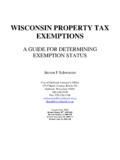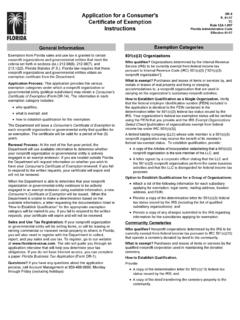Transcription of Federal Tax Obligations of Non-Proit Corporations
1 Federal Tax Obligations of Non-Profit Corporations Non-profit status may make an organization eligible for certain benefits, such as state sales, property, and income tax exemptions; however, this corporate status does not automatically grant exemption from Federal income tax. To be tax exempt, most organizations must apply for recognition of exemption from the Internal Revenue Service to obtain a ruling or determination letter recognizing tax exemption. Exemption as a charitable, educational, or religious organization under section 501(c)(3) is generally considered the most favorable status, because donations to 501(c)(3) organizations are tax deductible.
2 To be exempt under that section, an organization must apply within 27 months after the end of the month in which it was created. Although certain types of organizations are not required to apply for recognition of exemption, many do so in order to clarify their tax status. A user fee must accompany an exemption application. The IRS will not process an application until the user fee is paid. Required Applications Section 501(c)(3)organizations Form 1023, Application for Recognition of Exemption Under Section 501(c)(3) of the Internal Revenue Code Form SS-4, Application for Employer Identification Number (or apply for an EIN on-line at ; type EIN in the keyword box on any page).
3 Non-501(c)(3) organizations Form 1024, Application for Recognition of Exemption Under Section 501(a) of the Internal Revenue Code Form SS-4, Application for Employer Identification Number (or apply for an EIN on-line at ; type EIN in the keyword box on any page). Form 8718, User Fee for Exempt Organization Determination Letter Request Help Available from the IRS. Publication 4220, Applying for 501(c)(3) Tax-Exempt Status Publication 4221-NC, Compliance Guide for Tax Exempt Organizations (other than 501(c)(3) Public Charities and Private Foundations). Publication 4221-PC, Compliance Guide for 501(c)(3) Public Charities Publication 4221-PF, Compliance Guide for 501(c)(3) Private Foundations Publication 4630, Exempt Organizations Products and Services Navigator Publication 557, Tax-Exempt Status for Your Organization Download forms and publications at ; or call 1-800-829-3676 (toll-free).
4 Charities and Nonprofits website: Life Cycles: web-based information tools to help tax-exempt organizations comply with requirements that occur throughout the life cycle of their organization : web-based training modules and mini-courses EO Update: free electronic newsletter with information for tax-exempt organizations and tax practitioners who represent them TE/GE Customer Service: (877) 829-5500 (toll free). Applying for Federal Tax Exemption? New User Fees for 2010. An organization that applies for IRS recognition of its tax-exempt status must generally pay an application fee (sometimes called a user fee). These fees will increase for all applications for exemption (Forms 1023, 1024, and 1028).
5 Postmarked after January 3, 2010: $400 for organizations whose gross receipts are $10,000 or less annually over a 4-year period $850 for organizations whose gross receipts exceed $10,000 annually over a 4-year period $3,000 for group exemption letters. A complete schedule of all IRS user fees was published in the annual procedure released in January 2010. Notice 844 (Rev. 6-2010) Catalog Number 10319Q Department of the Treasury Internal Revenue Servic

















